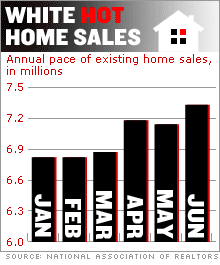 |
| Hot and cold home markets
|
| These real estate markets are the extremes: the fastest growing and the slowest. (Full story)
|
|
|
|
|
|
|
|
|
|
NEW YORK (CNN/Money) -
Existing home sales hit a new record in June in an industry report out Monday, as the real estate market remains hotter than Wall Street expectations, sending housing prices to their biggest increase in 25 years.
The National Association of Realtors reported that sales of existing homes came in at an annual pace of 7.33 million homes in June, compared with the revised 7.14 million pace in May. Economists surveyed by Briefing.com had forecast that sales would remain little changed at the 7.15 million pace in June.
The previous sales record was set in April, when sales hit the 7.18 million pace. The second quarter therefore has seen the three strongest sales months make up its three sales readings.
"Just when you think sales activity is ready to settle into a more sustainable pace, the housing market continues to surprise," said a statement from David Lereah, NAR's chief economist. "We've been expecting sales to remain at historically high levels, but this performance underscores the value of housing as an investment and the importance of homeownership in fulfilling the American dream."
The national median existing-home price for all housing types was another record of $219,000 in June. That was up 14.7 percent from a year earlier, the biggest year-over-year jump since November 1980. The June price was up 6 percent from the reading in May. The median price is the point at which half the home sell for more and half sell for less.
The average housing price, which is typically higher due to the impact of upper-end home sales, was $268,000, again another record, and up 9.4 percent from a year ago and up 4 percent from May.
Mortgage rates suggest the strong sales could continue, at least in the short term. The existing home sales data is based on when home sales close, which typically is a month or two after the sales are agreed to and mortgage rates are locked in.
The average 30-year mortgage rate in June was 5.58 percent, according to mortgage finance firm Freddie Mac. That's the lowest average since March 2004, and could spur more sales that will be reported in July and August reports.
While rates are up in July, they are still below the April and May averages that fed into this month's strong report.
A tight supply of homes is also driving up prices, according to officials with the NAR. The group's data shows that there is a 4.3 month supply of homes on the market, the same as in May, and low by historical standards. The average supply in 2004 was 4.3 months, and it was higher in 2002 and 2003.
"Home prices continue to be bid up in tight markets across the country," said NAR President Al Mansell, a Salt Lake City Realtor, in a statement. "Eventually, appreciation rates will slow and come down to normal levels when the shortage of homes on the market improves and comes closer into balance, hopefully, by the second half of next year."
But the report also fed growing concern among some observers that the rapid increases in housing prices represent a so-called housing bubble that could be at risk of a correction. Even Federal Reserve Chairman Alan Greenspan, who does not believe there is a bubble in the national housing market, warned Congress in testimony last week that there could soon be declines in prices at least some of the markets that have seen home prices soar.
"Whether home prices on average for the nation as a whole are overvalued relative to underlying determinants is difficult to ascertain, but there do appear to be, at a minimum, signs of froth in some local markets where home prices seem to have risen to unsustainable levels," he said in his semi-annual Congressional testimony.
However, one of the economists who is most convinced that there is a housing bubble said Monday the large jumps in prices and sales in this report do not necessarily a signal that the market has reached a peak.
"Things do seem like they're out of line, but of course I've been seeing warning bells for several years," said Dean Baker, co-director of the Center for Economic and Policy Research.
For a closer look at hot and cold housing markets, click here.
For more on the real estate market and how it affects you and your investments, click here.

|